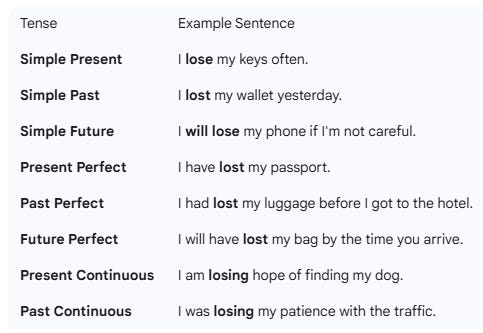What to Say When Something Goes Missing
Lost and Found
We’ve all been there. You reach into your pocket for your keys, but they’re not there. You look for your phone, but it’s not on the table where you left it. That feeling of panic when something important is lost is universal. But don’t worry, in this article and during the theme of this week, we’ll learn some essential English vocabulary and phrases to help you deal with a “lost and found” situation.
The Basics: Lost vs. Found
First, let’s understand the two key words: “lost” and “found.”
Lost is the past participle of the verb “to lose.” It means you can no longer find something.
Example: “I lost my wallet.” (This means your wallet is missing.)
Example: “My keys are lost.” (This is an adjective describing the state of the keys.)
Found is the past participle of the verb “to find.” It means you have located something that was previously missing.
Example: “I found my phone under the sofa.” (You have located it.)
Example: “My sister found a stray dog in the park.” (The dog was lost, and now she has located it.)
Watch this…
The root verb is to lose. Here are its forms and related words:
Verb Forms
Base Form (Infinitive): lose
Simple Past: lost
Past Participle: lost
Present Participle: losing
Adjectives
Lost: Describes something that is missing or no longer possessed.
Example: “The lost dog was found near the park.”
Example: “I found a lost glove.”
Losing: Describes a person or a team that is not winning.
Example: “The losing team felt disappointed.”
Example: “It was a losing battle from the start.”
Lossless: (Technical term) Refers to a type of data compression where no information is lost.
Example: “Lossless audio compression maintains the original sound quality.”
Nouns
Loss: The state of no longer having something; a disadvantage or an amount lost.
Example: “The company reported a significant financial loss this quarter.”
Example: “The loss of my grandfather was very difficult.”
Loser: A person who loses a game, competition, or argument. It can also be a rude term for a person who is unsuccessful or without worth.
Example: “The winner shook hands with the loser.”
Example: (Slang) “He acted like a sore loser after the game.”
Adverbs
There are no specific adverbs directly derived from “lose.” However, you can use the word at a loss to describe a state of confusion or not knowing what to do.
Example: “When he asked me the question, I was at a loss for words.”
Example: “She was completely at a loss as to how to fix the computer.”
Be careful too! Watch this…
Common Scenarios and Phrases
Here are some common situations where you might need to talk about lost and found items.
1. When you have lost something:
To tell someone you’ve lost an item:
“I’ve lost my keys. Have you seen them?”
“I seem to have misplaced my phone.” (A more polite and slightly softer way to say “lost.”)
“I can’t find my passport anywhere.” (A very common and direct way to express this.)
“My wallet is gone!” (Used when you realise it’s missing suddenly, often with a sense of panic.)
To describe the lost item:
“I’m looking for a small, black backpack.”
“It’s a red scarf, made of wool.”
“My glasses have a silver frame.”
“It’s a leather wallet with a zipper.”
2. When you have found something:
To tell someone you found an item:
“I found a pair of headphones on the bus. Do they belong to anyone?”
“Look what I just found!” (Used to express surprise and excitement.)
“I came across a dog’s collar in the park.” (”Come across” is a phrasal verb meaning to find something by chance.)
“I found this jacket. Did you drop it?”
To return the item:
“Excuse me, I think you dropped this.”
“Is this yours? I found it on the floor.”
“I’d like to turn in this wallet I found.” (To “turn in” means to give something to an authority, like a lost and found office.)
Useful Expressions and Phrasal Verbs
English has many different ways to talk about this topic. Let’s look at some alternatives and expressions.
Misplace: This is a very common alternative for “lose.” It often suggests that you lost something temporarily, and it’s your own fault for being forgetful.
Example: “I always misplace my car keys.” (This means you frequently put them in the wrong place and forget where.)
Finders keepers, losers weepers: This is a famous English idiom. It means that if you find something, you can keep it, and the person who lost it has to accept their loss. Be careful: this is usually said as a joke or by children and is not a serious legal principle!
Come across / run into: These phrasal verbs mean to find something or someone by chance.
Example: “While cleaning the attic, I came across some old photographs.”
Example: “I ran into my friend from high school at the mall.”
To go missing: This is another way to say something is lost, and it often suggests a more serious situation, especially for people or pets.
Example: “The cat has gone missing.”
Example: “Three valuable paintings went missing from the museum.”
Lost and Found (office/department): This is a specific place where people can go to report lost items or to look for items they have lost.
Example: “I’m going to check the lost and found at the train station to see if my umbrella is there.”
A Sample Conversation
Let’s put some of these phrases into practice with a short dialogue.
Sarah: Oh no! I can’t find my sunglasses. I’m sure I had them a minute ago.
Mike: Are you sure? Maybe you just misplaced them.
Sarah: I’ve looked everywhere. I’ve checked my bag, my pockets, and even my car. They’re just gone!
Mike: Hmm. What do they look like?
Sarah: They’re a pair of small, black sunglasses with a gold logo on the side.
Mike: Well, I didn’t see you drop them, but let’s go ask at the reception desk. Maybe someone turned them in.
Sarah: Good idea. I’ll go check the lost and found. Thanks, Mike.
Your Turn to Practice!
Now you are ready to talk about “lost and found” situations. The next time you can’t find your phone or you see a lonely scarf on a park bench, you’ll know exactly what to say. It’s a useful skill that you will definitely use in real life!



